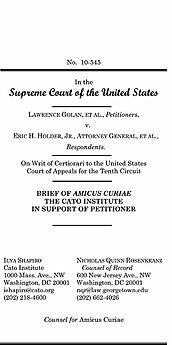Learn more about Cato’s Amicus Briefs Program.
In 1920, the Supreme Court decided an obscure case concerning the implementation of a treaty between the United States and Canada regarding migratory birds. Tucked into Justice Oliver Wendell Holmes’s five-page decision in Missouri v. Holland was a sentence that expressed a truly startling idea: that Congress can transcend its enumerated powers via the power to implement treaties. That is, although Congress has no enumerated power to pass, say, general criminal laws, if a ratified treaty with France demands that we pass such laws, then Congress’s power expands to allow for such legislation. Thus, foreign nations and the executive branch are given the power to change, almost at will, one of the most hotly debated and carefully crafted sections of the Constitution, the scope of Article I congressional power. Now an equally obscure case relating to copyrights gives the Court an opportunity to revisit Missouri v. Holland’s starkly erroneous proposition and reaffirm the Framers’ vision of Congress’s powers as “few and defined.” Golan v. Holder concerns a law Congress passed after the president signed and the Senate duly ratified the “Uruguay Round” general trade agreement, which in part amended the 1971 Berne Convention on intellectual property. This new law reinstated copyright protection to works that were previously in the public domain. A number of orchestra conductors, educators, performers, film archivists, and motion picture distributors who depend on the public domain for their livelihood challenged the law on two grounds: 1) that it violates the “promote progress in Science and the Useful arts” limitation on the congressional power to pass copyright laws (the Copyright Clause), and 2) it violates the First Amendment. Cato and Georgetown law professor Nicholas Quinn Rosenkranz filed a brief that supported this challenge by highlighting the problems with an expansive interpretation of the treaty power. We argue that, as a matter of constitutional structure, history, and logic, a treaty cannot increase Congress’s legislative powers. Not only is the power to “make treaties” distinct from the power to execute treaties already made, but such an expansive interpretation of the treaty power would allow Congress and the Executive to circumvent the Article V amendment process and, even more shockingly, allow foreign governments to have control over the scope of congressional power. We further argue that Missouri v. Holland is a structural and doctrinal anomaly in tension with other precedent and based on a misreading of constitutional history. It should be overruled.

This work is licensed under a Creative Commons Attribution-NonCommercial-ShareAlike 4.0 International License.



